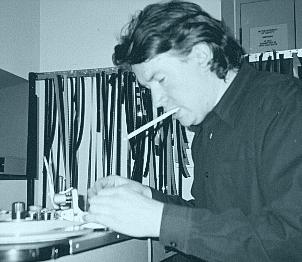
 |
: the Director on the Film |
THE DIRECTOR ON THE FILM, MAY 2008:
 In the real world things can change extremely
quickly. In the UK we've gone from economic boom to
credit crunch - just like that. A major bank nearly
collapses for the first time in 150 years. The word
"recession" keeps recurring. People start to look
worried.
In the real world things can change extremely
quickly. In the UK we've gone from economic boom to
credit crunch - just like that. A major bank nearly
collapses for the first time in 150 years. The word
"recession" keeps recurring. People start to look
worried.
Yet in the unreal world of British film-making things look re-assuringly familiar. As usual, nothing much is happening. It's like waiting at the airport for planes that never take off. Schoolgirl romp St.Trinian's is the UK's most successful home-produced film (just like in 1952, or whenever it started, except now in colour). St.Trinian's 3,4,5,6, and 7 are doubtless on the drawing board (Hugh Grant as Headmistress, anyone?). Meanwhile Hammer Films are releasing horror via the internet ("House Price Crash VI"), and the great white hope of the UK film industry is re-surfacing... Yes, there will be another "Carry On" film! |
||
|
The new "Carry On" - possibly starring Carla Bruni, Vinnie Jones, Chris Eubank, and Barbara Windsor - will be the 15th in the series, having started 50 years ago (No joke). Still being planned, a lot of the original team are still carrying the torch for the new work ahead, like marathon runners bravely tottering in to an eerily quiet Olympic stadium. They are strangely ahead, and strangely alone, as there are no other runners in the race. Re-assuringly, in a recent interview to announce the project, Ned Hudis, aged 85 - screenwriter of the first 6 "Carry On" films and raring to go-welcomed back his old colleages to Pinewood Studios (home of James Bond etc.) - and looked forwards to their next picture together. "Not many of us are left", said Ned. "We thought we'd better have the reunion this year. Next year it could have been a seance." |
||
| Well - Good luck, Ned! Film-making benefits from people of all ages. But there is something grimly apposite in 85 year old Ned and "Carry On London" lumbering in to view on a deserted British film landscape, one that looks like London after the Blitz - flat and covered in rubbish. Sadly, as far as the UK film industry is concerned, a seance and a ouija board may be needed to reach it for a long time to come. For we are stuck in the past, and the reason is simple: UK films continue to look backwards. Oblivious to what's really going on in the street or outside our windows, the film industry desperately clings on to trying to pump life in to what worked 50 years ago. Yet that audience hardly exists anymore. Like a cheap black and white film about World War 2, our unshaven British heroes pluckily wait on the freezing French beaches to be rescued by a fleet of little boats. "Save us before the Americans arrive" they plead. But it's too late, the Americans have won. They own the cinemas. The mythological past of UK cinema no longer really exists. We have to face the disturbing truth that everything has changed. The time for plucky Ealing comedies has gone. | ||
| The challenge for cinema now - as the US writers strike showed, one which cost Hollywood $1 billion - is the internet. It is from there that any new ideas will come. But the only way they'll be new is if their makers completely forget the baggage of the past. With the greatest respect to Ned, it's very bad news for UK film-making if - 50 years after his debut with "Carry On Sergeant" - his next project is our only UK hope for cinema salvation. Sadly, for us it's pointless looking back to the ghosts of cinema past. Putting on retrospectives of old British films is as pointless as hanging up pictures of Queen Victoria. Like the opening of the new Terminal at Heathrow Airport, British film-making isn't working. Luggage piles up. Flights are cancelled.No one will look you in the eye. Naomi Campbell starts screaming. And no one's really bothered whether you get anywhere or not... And so we look backwards, when everything worked. | ||
| Yet, it could all be so different. New, disturbing things could be happening. For in 2008, the availability of digital cinema screens and the increased speed of internet connections potentially allows different kinds of British films to reach large audiences for maybe the first time. And it could happen. | ||
|
Let's hope so. Otherwise our only hope in 50 years
time will be to contact the - by then - 135 year old
Ned.
But by then it will be too late for Ned to help us... A fixation on the past can only diminish the present and ultimately mean there's no future. |
||
© Guy Byrne 2008